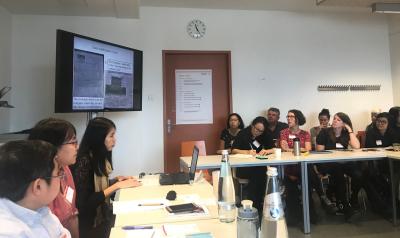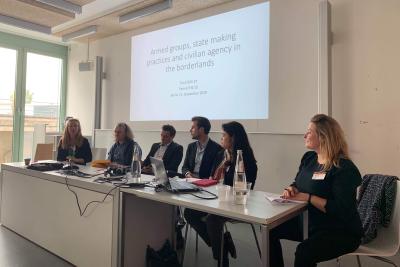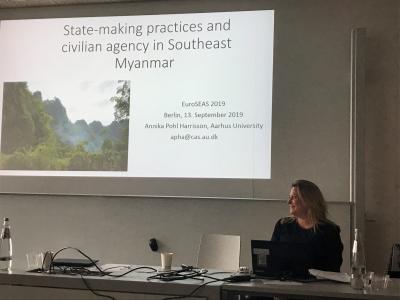EverJust research at EUROseas conference in Berlin

The EveryJust project researchers from Myanmar presented their research findings at the EUROseas conference in Berlin held on 9-13 October 2019, at a double panel on ‘Everyday Justice in Myanmar’. It featured papers on the resolution of disputes and crimes in Kachin, Karen, Naga and Pa-O areas of Myanmar.
A common topic was the question of why most people avoid the state’s justice system, and instead prefer to access local justice. Many factors contribute to this preference, including the fear of formality, the avoidance of community conflicts, the role of religious beliefs, the strength of customary law, and the significance of ethnic affiliations.
The paper on Kachin by Myat Thet Thitsar especially showed how the desire for social harmony within small-scale societies, draw people away from seeking justice with the state and more institutional customary forums.
Than Pale presented a paper on a mixed Karen-Muslim village, and argued that there are no conflicts between the two religious groups in this village, because they share identity based on place, rather than ethno-religious identity, and because they always resolve disputes together. Their capacity to avoid external influences by the state and by religious organizations also contributes to internal peace in the village.
A third paper by Lue Htar and Helene Kyed based on studies in an urban Karen ward, showed that state evasion in the field of justice is strongly influenced by a shared mistrust in the state system to deliver desirable forms of justice, notably compensation and the repair of social relations. Here Buddhist religious beliefs in karma, and the role of spiritual actors in explaining misfortunes and crimes, also substitute for secular justice in the state system.
Thang Sorn’s paper addressed the continued role of armed men in reducing people’s access to justice in land disputes and drug cases in the Pa-O self-administered zone. The paper contributes with empirical insights to debates about rebel governance that portrays rebel groups as ambiguous actors who both provide security and install insecurity.
Finally, Myat The Thitsar presented a co-authored paper on Naga, which discusses the pros and cons of state recognition of customary law and argues that the strength of customary law in Naga is linked to both mistrust in the state and to the desire for a unified Naga national identity. All presented papers are part of a book project that will be finalized in 2020.

EverJust PhD candidate, Annika Pohl Harrisson (Aarhus University) also organized a panel titled ‘Armed Groups, State-Making Practices and Civilian Agency in the Borderlands’. She presented her findings on the state-making practices of the New Mon State Party (NMSP), which is the largest ethnic armed group among the Mon in Myanmar. She introduced her concept of ‘encompassed states’ to highlight how people living in Mon ceasefire areas must navigate within not one, but three different states: the NMSP state, the Myanmar state and the state of the Karen National Union (KNU). They do so often pragmatically, holding different land certificates and being subject to different forms of taxation, but their loyalty nonetheless remains with the NMSP.
The panel drew together papers on armed groups in other areas of Southeast area, contributing to useful comparison, such as the effects of very long term conflict, unsuccessful peace agreements, the blurred boundaries of state and non-state actors, and the question of how armed groups produce legitimacy.

DIIS Experts


